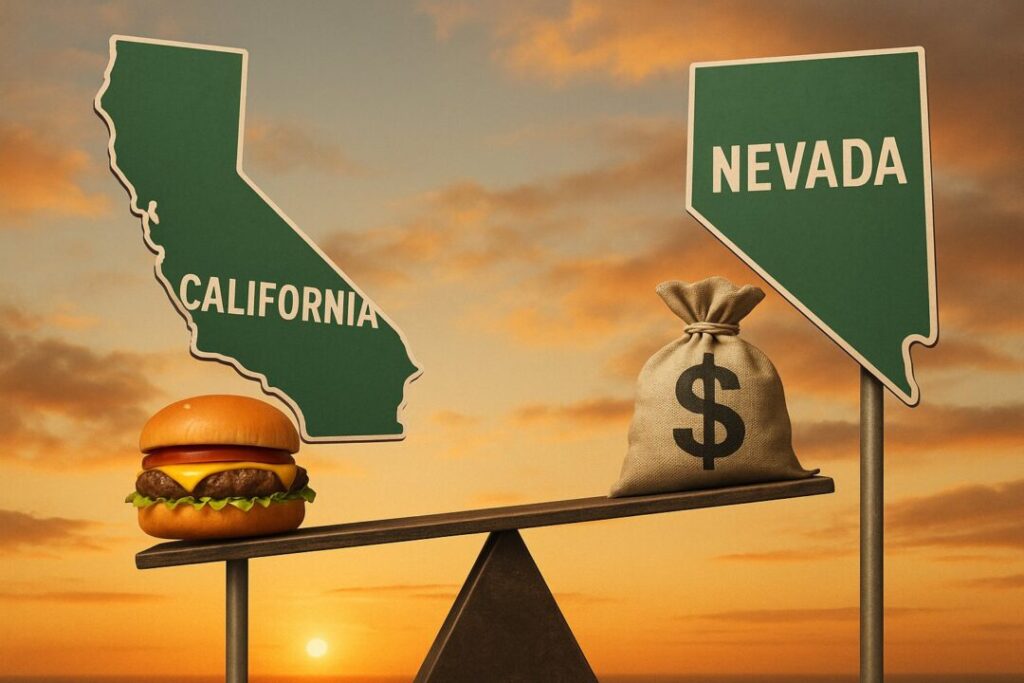(Kelly Chapman) – A new study is raising serious red flags about California’s recent decision to hike the minimum wage for fast food workers to $20 an hour and it could be a preview of what’s coming to Nevada if lawmakers here follow suit.
The study, released by the nonpartisan Employment Policies Institute and reported on by the Daily Mail, shows exactly what conservatives have been warning about for years: when the government forces businesses to pay more than they can afford, prices go up, jobs go down, and workers lose out in the long run.
The California law, signed by Governor Gavin Newsom, took effect in April 2024.
It boosted the minimum wage for fast food workers from $16 to $20 an hour – a nearly 25% jump. Supporters claimed it would help low-income workers keep up with inflation.
But the reality turned out very differently.
According to the study, California fast food restaurants cut nearly 10,000 jobs in the months leading up to the wage increase.
Since the law passed, big chains like Pizza Hut and Subway have announced major layoffs.
Other stores have closed altogether.
Automation is speeding up. Self-service kiosks are replacing workers at record pace.
“The job losses we’re seeing are just the tip of the iceberg,” warned Michael Saltsman, executive director of the Employment Policies Institute. “When labor costs go up this fast, restaurants have no choice but to cut hours, raise prices, or shut their doors.”
What It Means for Nevada
Here in Nevada, we’re not far behind.
The state’s minimum wage is already on track to hit $12 an hour this year thanks to a 2019 law pushed by Democrats.
And groups like the Progressive Leadership Alliance of Nevada have floated the idea of tying wages to inflation or pushing for even higher base pay.
That might sound good in theory – especially in expensive cities like Las Vegas or Reno – but California’s example shows how it can backfire.
Nevada’s economy depends heavily on hospitality, food service, and tourism.
That means restaurants, hotels, and small shops can’t afford to keep up with forced wage hikes without cutting staff or raising prices on customers.
And when prices go up, tourists might start going elsewhere. Indeed, they already are.
Take a family of four stopping for burgers on the Strip. What used to cost $40 might now cost $60 or more, just to cover labor costs.
Add that to higher hotel rates, parking fees, and show tickets, and suddenly Las Vegas becomes less affordable – not just for tourists, but for working families who live here, too.
Many small businesses in Nevada are already feeling the squeeze. Rent is up. Insurance is up. Utility bills are up.
If the state follows California’s lead and forces wages even higher, it could be the final straw for mom-and-pop shops already barely hanging on.
Critics Say It’s “Fair” — But Is It?
Supporters of the California law say it’s about “fairness” and helping workers make ends meet.
But if workers end up losing their jobs or getting fewer hours, is that really helping?
Even liberal-leaning economists like UC Berkeley’s Jesse Rothstein have warned that dramatic wage increases can lead to “disemployment,” especially in sectors like fast food where profit margins are thin and automation is easy.
It’s simple: when government tries to play boss and tell private businesses how much to pay, it often ends up hurting the very people it’s supposed to help.
Nevada voters should keep a close eye on what’s happening next door in California.
The Silver State has long been a place where people could find work, take care of their families, and build a better future.
But that promise only works if we let the free market do its job, not politicians in Carson City trying to copy California’s failed ideas.
This article was written with the assistance of AI. Please verify information and consult additional sources as needed.




